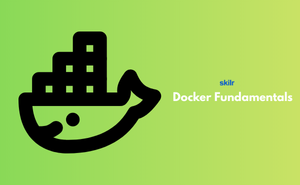👇 CELEBRATE CLOUD SECURITY DAY 👇
00
HOURS
00
MINUTES
00
SECONDS

The Docker Fundamentals certification introduces learners to the foundation of containerization. It teaches how to package applications with their dependencies into lightweight, portable units called containers. This eliminates common software issues caused by differences in environments and ensures consistent performance everywhere.
Think of Docker as a special shipping container for your software: once packed, it can be transported and used anywhere without worrying about what’s inside or where it’s going. By mastering Docker Fundamentals, professionals gain the ability to streamline workflows, reduce deployment errors, and make applications scalable and easier to maintain.
This exam is ideal for:
Domain 1 - Introduction to Docker
Domain 2 - Docker Architecture
Domain 3 - Working with Containers
Domain 4 - Docker Images
Domain 5 - Networking in Docker
Domain 6 - Data and Storage
Domain 7 - Docker Compose
Domain 8 - Security and Best Practices
Domain 9 - Introduction to Orchestration
Industry-endorsed certificates to strengthen your career profile.
Start learning immediately with digital materials, no delays.
Practice until you’re fully confident, at no additional charge.
Study anytime, anywhere, on laptop, tablet, or smartphone.
Courses and practice exams developed by qualified professionals.
Support available round the clock whenever you need help.
Easy-to-follow content with practice exams and assessments.
Join a global community of professionals advancing their skills.
To master Docker, you need to understand containerization, Docker commands, and image management. Essential skills include creating and managing Docker containers, using Docker Compose for multi-container applications, networking and storage management within containers, and utilizing Docker Hub for image repositories. Familiarity with command-line interfaces and integration of Docker in CI/CD pipelines are also vital for seamless application deployment and management.
Docker skills are highly valuable for roles like DevOps engineers, cloud engineers, system administrators, and developers. Developers can containerize applications, while DevOps engineers and cloud architects can use Docker for continuous integration, delivery, and deployment processes. System administrators benefit by managing containerized environments, optimizing resources, and enhancing infrastructure efficiency.
Docker uses containerization, where applications run in isolated environments called containers. Unlike virtual machines, containers share the host operating system’s kernel, making them lightweight and faster to deploy. VMs, on the other hand, require their own operating system, leading to higher resource usage and longer boot times. Docker containers are more efficient, offering faster scaling and better performance for modern application development.
Docker is a platform that enables developers to create, deploy, and manage applications within containers. These containers allow applications to run consistently across different environments, improving scalability, portability, and efficiency. Docker is crucial in modern software development as it simplifies deployment, enhances automation, and supports DevOps practices, allowing teams to focus on coding while reducing environmental issues.
Docker integrates seamlessly with Kubernetes, a container orchestration tool, to manage large-scale applications. While Docker focuses on container creation and management, Kubernetes automates the deployment, scaling, and monitoring of containers in production. Docker is often used for creating the containers, while Kubernetes ensures efficient orchestration and management of these containers across clusters.
Docker offers several advantages, including portability, scalability, and efficiency. Since Docker containers can run consistently across different environments, it eliminates issues caused by differing configurations. Docker also supports microservices architecture, making it easier to build, test, and scale applications. Furthermore, Docker simplifies CI/CD processes, automates deployment pipelines, and enables faster time-to-market for new features.
Docker Compose is a tool used to define and manage multi-container Docker applications. It allows developers to use a YAML file to configure services, networks, and volumes, enabling seamless orchestration of complex applications. Docker Compose simplifies managing multiple containers by providing a single command to start, stop, and manage the entire application stack, which is especially useful for development, testing, and production environments.
Professionals with Docker expertise are in high demand for various roles such as DevOps Engineer, Cloud Engineer, Software Developer, and System Administrator. Docker knowledge is essential for roles focused on automating infrastructure, deploying applications in the cloud, and implementing microservices architectures. With the increasing adoption of containers, Docker skills provide access to opportunities in cloud computing, containerized app development, and infrastructure management.
The demand for Docker skills is rapidly increasing due to the shift towards containerized environments and microservices architectures. As companies adopt DevOps practices, cloud-native applications, and automation in their deployment pipelines, Docker has become a key technology. The job market for Docker-related roles is expected to grow significantly, particularly for DevOps engineers, cloud architects, and developers with expertise in containerization and orchestration technologies like Kubernetes.
Docker promotes collaboration by ensuring consistency in development environments. Developers can package their applications and dependencies in containers, which can be shared across teams. This eliminates the "it works on my machine" issue, as containers guarantee that applications run the same way on different systems. Docker's integration with version control and CI/CD tools further enhances teamwork, ensuring that everyone is working with the same application setup.